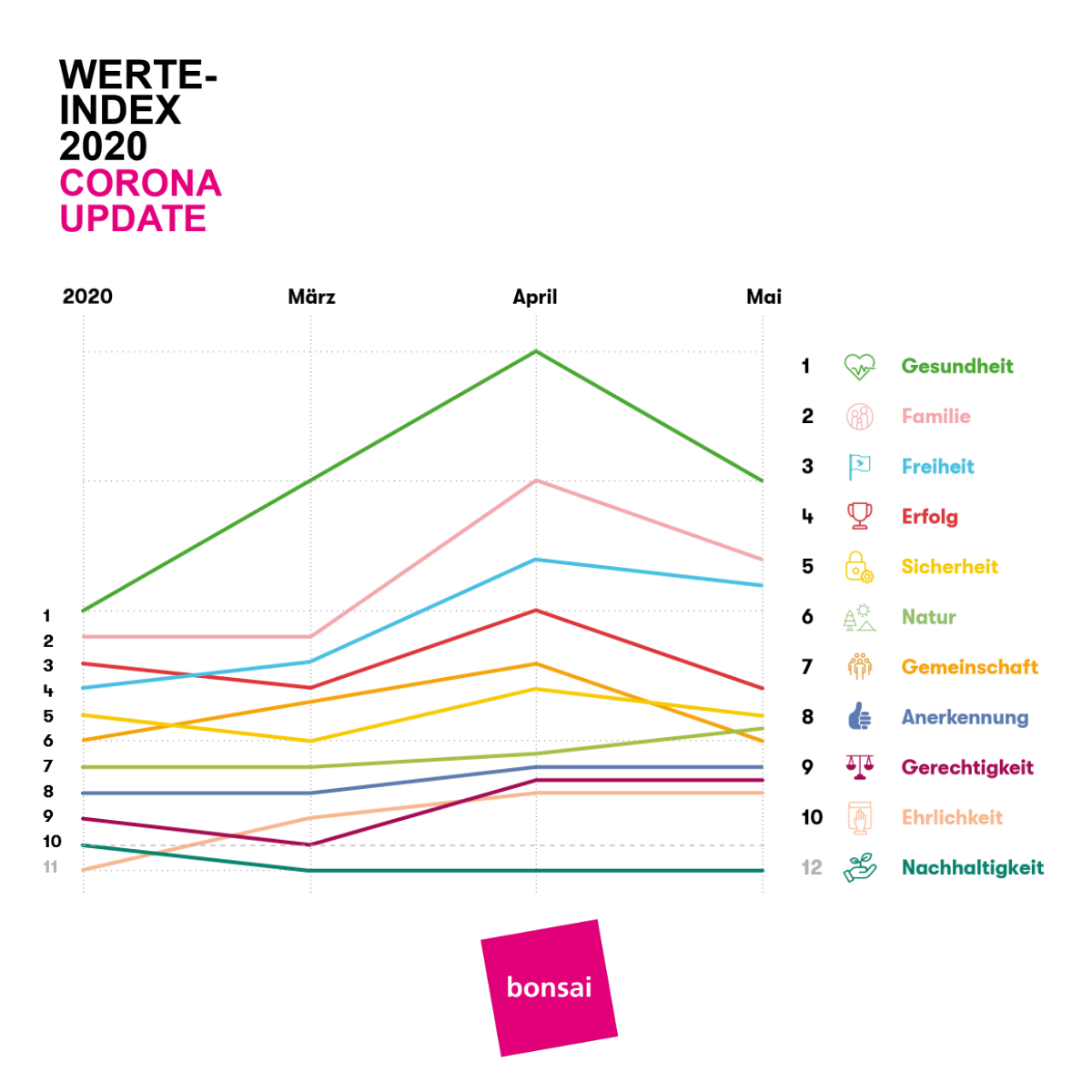Values Index 2020 Corona Update: 5 trends that companies need to know about
The update of the largest social media study on changing values shows how the values of consumers in Germany have changed in the course of Covid-19 and what effects this can have for communication, marketing and corporate strategies.
Consumers are setting new priorities: The shift from lifestyle to politics, which was already observed in the Values Index 2020 - i.e. before Corona - is clearly intensifying. Values such as freedom and transparency are becoming more important to social media users. In order to document the change in values in times of the pandemic, the Trendbüro, measury, Kantar and Bonsai Research have recorded the current discussion of values on the German-language Internet for the 2020 Values Index Corona Update.
As before the crisis, the seven most discussed values include health, family, freedom, success, security, nature and community. It is noticeable that the value of freedom, after continuously declining from first place at the beginning of the 2009 long-term values study, is now back in the top three. Within the current normalisation process, there are five identified business implications for success during and after the crisis.
5 Implications for companies
1 Digitalisation & Automation - Online? Anything goes.
The Corona Lockdown has accelerated digitisation and automation processes. Digital products and services create added value when they are convenient. In addition, they should also increasingly provide security in everyday life. They are accepted when they focus on the interests of the users. More than ever, consumers want to delegate tasks and decisions to technologies, while at the same time their actual consumer benefits are increasingly being put to the test. It is important for organisations to invite users to participate in the design process.
2 Hyper-individualisation - Me, myself and us?
The confluence of social distance and accelerated digitalisation has given individualisation considerable momentum. More data enables ever more precise personalisation. In the lockdown, individual needs have differentiated in relation to the community: Consumers want to be more independent of others in many things (from home offices to online yoga classes). The individualisation of products and services works best when it is reflected in diversity management: It is about recognising individuals for who they are and what they aspire to be, and empowering them in it.
3 Self-empowerment - What to do with all the lemons?
To stay empowered in a complex, uncertain world, consumers are seeking to empower themselves. The growing DIY, right-to-repair and hacker movements show that there is a growing desire for products and services that make consumers more independent. Examples are durable and (self-)repairable products with timeless design as well as offers that work easily and smoothly. It is also more important than ever to actively involve employees and give them the opportunity to shape their own work content and hours, career and life, and to take responsibility.
4 Purpose - What is socially relevant?
The COVID-19 pandemic shows how important it is to question the meaning of one's own actions and the purpose of a company. All the more reason for companies and brands to know, implement and communicate their own contribution. The trend is moving away from shareholder value towards the creation of shared value. Recent months have shown that changing demand for certain product categories can inspire changes in one's product or service portfolio. "Good" and "fair" providers are preferred in consumers' future purchasing decisions, especially in times of recession.
5 System reflection - Do we have to?
Crisis management is now about questioning how we want to live and work together sustainably and how we talk about things, about the usefulness of certain routines. Consumers don't want flowery promises, but factual, authentic communication at eye level. At the same time, the questions of how we want to live and work together leave few cold. With the increased social awareness, the big questions are being asked and companies are also seen as formative players.
Summary
The sifting of data from the period of the acute situation around the COVID-19 pandemic from March to May indicates an intensification of the thematic change in discussion content observed in the 2020 Values Index: less lifestyle, more politics - above all through a higher level of critical and reflective expression of opinion.
With the acceleration of digitalisation and automation, hyper-individualisation, self-empowerment, purpose and system reflection, the changed understanding of values shows itself full of polarities and open questions. However, the insights of this Corona update can be used and implemented in practice.
Download the 2020 Values Index Corona Update
About the 2020 Values Index Corona Update
For the update, around 3.3 million posts in German-language social media channels were examined quantitatively and qualitatively. Based on hypotheses from trend and futurology research, the contents of the collected social media posts were sifted to obtain a comprehensive picture of the upheaval of the COVID 19 epidemic on the users' discussion around fundamental social values.
About the Values Index
The German Values Index has been published every two years since 2009 by the editors Peter Wippermann and Jens Krüger and surveyed together with the research team from Bonsai, Trendbüro and Kantar. The basis of the publication is the recording of 15 fundamental values in German-language social media. Since 2018, Instagram has been included in the analysis as a social media source and thus image material. This update shows the current top 10 in changing values in our society in the context of the COVID 19 pandemic. To the Values Index
Jens Krüger has analysed the challenges that the change in values will bring for companies in an article in Bonsai Sales Magazin.
- To the PDF of the article LINK
- To the order form Bonsai Sales Magazine LINK


